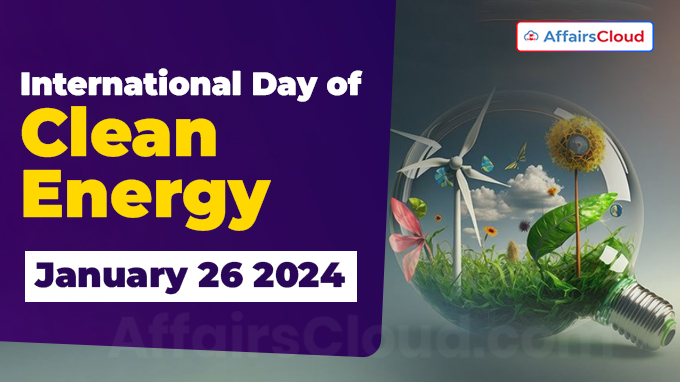 The first-ever United Nations (UN) International Day of Clean Energy was globally observed on 26 January 2024 to create awareness and mobilise action towards a fair and inclusive transition to clean energy for the benefit of people and the planet.
The first-ever United Nations (UN) International Day of Clean Energy was globally observed on 26 January 2024 to create awareness and mobilise action towards a fair and inclusive transition to clean energy for the benefit of people and the planet.
Note: Clean energy plays a key role in reducing greenhouse gas (GHG) emissions and helping communities access reliable power sources.
Background:
i.On 25 August 2023, the United Nations General Assembly (UNGA) adopted the resolution A/RES/77/327 and proclaimed the 26 January of every year as the International Day of Clean Energy.
Significance of January 26:
i.26 January is also the founding date of the International Renewable Energy Agency (IRENA), a global intergovernmental agency established in 2009.
- IRENA supports nations in their adoption and deployment of renewable energy and serves as a platform for international cooperation.
- It provides data and analyses on clean energy technology, innovation, policy, finance, and investment.
ii.26 January 2024 marks the 15th anniversary of the International Renewable Energy Agency (IRENA).
Significance:
i.Clean energy is key to supporting communities lacking access to reliable power sources and adopting clean energy is integral to the fight against climate change.
ii.The Global Clean Energy Imperative:
- In the face of climate change, clean energy plays a vital role in reducing emissions.
- 675 million people lack access to reliable power, with Sub-Saharan Africa representing 4 in 5 of this demographic.
iii.The connection between clean energy, socio-economic development, and environmental sustainability is crucial in addressing issues faced by vulnerable communities worldwide.
Challenges Faced by Communities Without Clean Energy:
i.Lack of reliable power hinders education, healthcare, and economic opportunities.
ii.Many of the developing regions heavily rely on polluting fossil fuels, perpetuating poverty.
iii.Without intervention, by 2030, 1 in 4 people may still use unsafe, unhealthy, and inefficient cooking methods like burning wood or dung.
Clean Energy and Climate Change:
i.GHG, a major contributor to climate change, results from burning fossil fuels (oil, coal, and gas) to generate electricity and heat.
ii.Transitioning to clean, renewable sources is imperative for climate change mitigation.
iii.Renewable energy, abundant and nature-replenished, emits minimal GHGs.
Sustainable Development Goal (SDG) and Clean Energy:
i.The UN SDG 7 is about ensuring access to clean and affordable energy for all by 2030, which is key to the development of agriculture, business, communications, education, healthcare, and transportation.
ii.Current trends indicate a shortfall; the UNGA will hold a Global Stocktaking on Sustainable Energy in April 2024 for assessment and solutions.
Key Facts:
i.Coal, oil, and gas (fossil fuels) are responsible for nearly 90% of global carbon dioxide (CO2) emissions.
ii.Fossil fuels still dominate global energy production, but renewable sources of energy, such as wind, solar, hydro, and geothermal, now power about 29% of electricity worldwide.
iii.As of 2023, some 675 million people were not on an electricity grid, and 2.3 billion people were cooking with dirty fuels;
2024 Events:
IRENA celebrated the International Day of Clean Energy by organising a virtual panel discussion together with the Permanent Mission of the United Arab Emirates (UAE) to the UN and the Permanent Mission of Panama to the UN.




